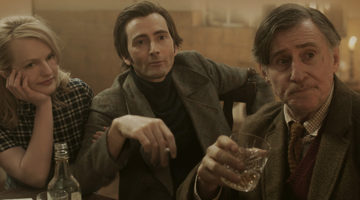Review: Far From Men
Far From Men is a savvy entry into a familiar drama, the one that finds a prisoner endearing himself to the man who is holding him captive. Two men who are seemingly different find common bond, and even affection. Set in 1954 Algeria, amid rebellion for independence, an idealistic schoolteacher (Viggo Mortensen) assumes the duty of escorting a prisoner accused of murder (Reda Kateb) to some sort of just salvation.
While men are fleeing and chaos and lawlessness reigns down, Daru remains steadfast, desiring to maintain his teaching duties, educating a new generation on how to read. When an Arab prisoner named Mohamed is dropped off at his outpost, though, he is tasked with taking him to a police station.
Of course there are those that simply want the man dead, and Daru is torn by faith and heritage. Algerian born, French speaking, with Spanish ancestry, Daru opts defiantly, perhaps foolishly, to see this mission through.
So begins a trek across hazardous, yet incredibly beautifully-shot terrain, avoiding the perils of winter and the passion of men not bound by law or morality. Bound together, the two slowly unite.
Mortensen allows a glimmer of warmth and frustration to seep through his rocky exterior, his hopefulness clashing with self-preservation. On his side is Kateb, whose quiet nature and resigned face make him most sympathetic.
As strangers and soldiers come and go, with gunfire and death following, we always seem to return to the two men, alone, only with a destination in sight and stories and sentiments to share. Director David Oelhoffen rides the great performances, allowing silence to creep in, watching them wander the eerie landscape. When danger arrives, it seems to come swiftly (thankfully) and loudly, only to disappear once more.
Sitting against a desolate expanse, and buoyed by a subtle, powerful score, Mortensen and Kateb make Far From Men a gripping, and indeed gritty, watch.
[star v=4]


